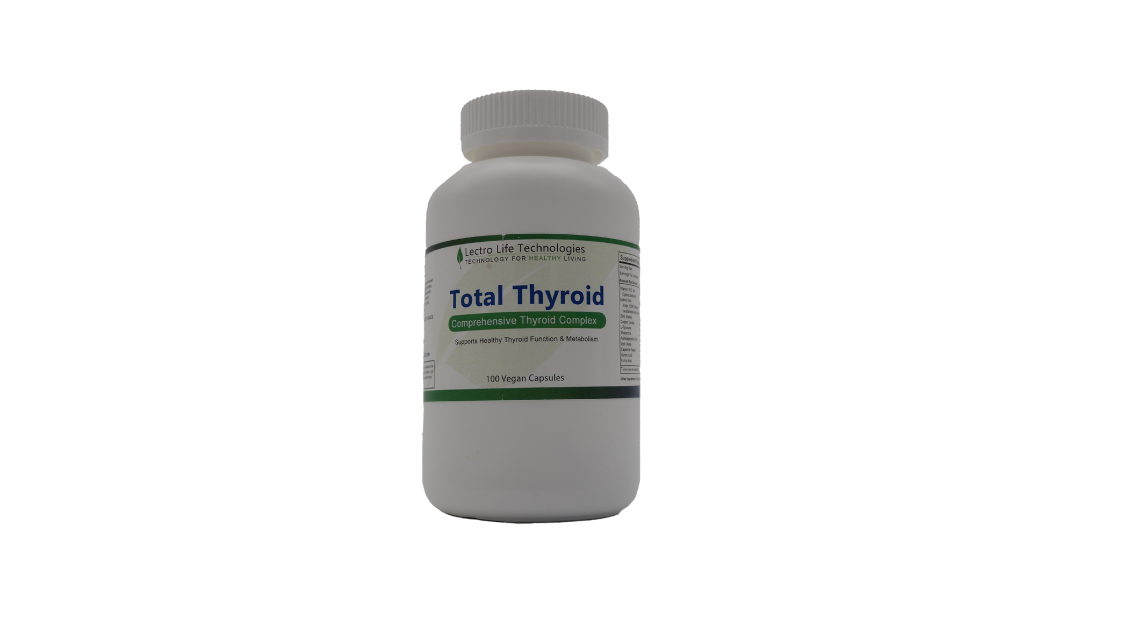In vertebrate anatomy, the thyroid gland or simply, the thyroid, is one of the largest endocrine glands in the body, and is not to be confused with the "parathyroid glands" (a completely different set of glands). The thyroid gland is found in the neck, inferior to (below) the thyroid cartilage (also known as the 'Adam's Apple') and at approximately the same level as the cricoid cartilage. The thyroid controls how quickly the body uses energy, makes proteins, and controls how sensitive the body should be to other hormones.
The most common problems with the thyroid gland is an over-active thyroid gland, referred to as "hyperthyroidism", and an under-active thyroid gland, referred to as "hypothyroidism".
Total Thyroid Health is a specifically formulated to support the thyroid in the war against hypothyroidism. The thyroid gland is controlled by the hypothalamus and pituitary gland and gets its name from the Greek word for "shield". In vertebrate anatomy, the thyroid gland or simply, the thyroid is one of the largest endocrine glands in the body. The thyroid controls how quickly the body uses energy, makes proteins, and controls the sensitivity of the body to other hormones.
The thyroid gland participates in these processes by producing thyroid hormones, principally triiodothyronine (T3) and thyroxin (T4). These hormones regulate the rate of metabolism and affect the growth and rate of function of many other systems in the body. T3 and T4 are synthesized utilizing both iodine and tyrosine. The thyroid gland also produces a hormone called "calcitonin", which plays a role in calcium homeostasis.
The thyroid gland is controlled by the hypothalamus and pituitary (specifically, the anterior pituitary). The thyroid gland gets its name from the Greek word for "shield", after the shape of the related thyroid cartilage. The most common problems of the thyroid gland consist of an over-active thyroid gland, referred to as "hyperthyroidism", and an under-active thyroid gland, referred to as "hypothyroidism".

VITAMIN B-12 (AS CYANOCOBALAMIN)
In 2001 Tufts University came out with a study found that as many as 40% of men and women have low levels of B-12, based on the B-12 blood levels of 3,000 adults. Vitamin B-12 also known as cyanocobalamine or cobalmin, is an essential vitamin that is required for the development of red blood cells. It is also used to make the protective coating surrounding nerves. B-12 is found mainly in animal based foods such as meat, poultry, milk products, eggs and fish.
In the study, they found that low B-12 levels were common in the entire population, but of those tested 39% had levels on the boarder or slightly below the cutoff, 17% had very low levels and 9% had levels so low that they are clinically deficient. When a person is deficient in B-12 it can cause a type of anemia that is characterized by fewer but larger red blood cells. Other effects of a B-12 deficiency are walking and balance disturbances, a loss of vibration sensation, confusion and in advance cases dementia.
IODINE FROM KELP (100% SUSTAINABLE & WILD GROWN)
Iodine makes up less than a hundred thousandth of a percent of your body weight, but your thyroid cannot function without this trace mineral. If you have too little iodine in your diet, hypothyroidism and weight gain will occur. "I believe that an insufficient intake of organic iodine in today's modern diet has led to a serious and chronic form of low-grade hypothyroidism," writes Donald R. Yance, Jr. in Herbal Medicine, Healing and Cancer. Increasing your iodine level will allow your thyroid function and metabolic rate to return to normal.
ZINC (OXIDE) 58 MG 53% AND COPPER (AS OXIDE)
Thyroid diseases caused due to unbalanced levels of copper and zinc are:
Hyperthyroidism
Copper and zinc work together in the body as important antioxidants. Deficiency of zinc causes a deficiency of the antioxidant enzyme Superoxide dismutase (SOD), and leads to oxidative stress and ant oxidative response in the patients of hyperthyroidism. Deficiency of copper also causes hyperthyroidism because the thyroid gland produces excessive hormone when the body is copper deficient.
Hypothyroidism
An imbalance of zinc and copper ratio in the body causes hypothyroidism, which is a thyroid disease that causes the thyroid gland. Research has shown that supplementation of the diet with first zinc, then copper, helps in hypothyroidism treatment and increases thyroid function. Zinc deficiency also causes low metabolic rate, which often results in immune dysfunction, so this is why it is important to get the right levels of zinc first.
L-TYROSINE
ND recommended for depression and fatigue.
SCHIZANDRA (HERB POWDER)
Schizandra--a Chinese herb that is used for fatigue.
ASHWAGANDHA ROOT (HERB POWDER)
"...These findings reveal that the Ashwagandha root extract stimulates thyroid activity and 'that Ashwagandha extract] also enhances the anti-peroxidation* of 'liver] tissue." Emphasis added.
*Peroxidation can destroy tissue. Therefore, Ashwagandaha is somewhat protective to the liver.
Ashwagandha and Under-Active Thyroid Bibliography Journal of Pharm. Pharmacol., vol. 9, 1998. By: Drs. Panda & Kar, School of Life Sciences, D.A. University, Indor, India.
CAYENNE PEPPER (POWDER)
One of the most remarkable qualities of Cayenne is its ability to act as a catalyst. Cayenne intensifies the beneficial effects of other herbs by ensuring speedy and thorough distribution of the herb’s active components to the important functional centers of the body such as those responsible for metabolism, data transmission, cellular respiration and neural hormonal activity.
The herb itself contains many nutrients essential to the health of the circulatory system including alpha-tocopherols, vitamin C and minerals. Cayenne also contains a high amount of vitamin A (beta-carotene) which aids in healing ulcers... Cayenne’s high mineral content, including sulphur, iron, calcium, magnesium and phosphorus, makes it an effective treatment for diabetes, gas, arthritis, pancreatic and throat disorders.
- Fatigue
- Dry skin
- Weight gain (fluid retention)
- Yellow skin
- Hair loss - including the eyebrows
- Swollen face, hands, legs, ankles or feet
- Extreme sensitivity to cold
- Aches and pains in muscles or joints
- Hoarse or raspy voice
- Constipation
- Heavy menstrual bleeding/irregular periods
- Decreased heart rate
- Progressive hearing loss
- Goiter (enlarged thyroid gland)
- Muscle pain or weakness
- Numb, tingling hands
- Swollen eyelids
- Changes in cholesterol
- Infertility
- Dryness or premature graying of hair
- Slower movements
- Depressed
- Slower thinking
- Loss of interest in sex
- Slower speech
- Trouble remembering
As a dietary supplement, take one (1) capsule in the morning.
Do not exceed recommended dose.
Do not use in conjunction with other products high in iodine as excessive iodine intake may be harmful.
Pregnant or nursing mothers, children under 18, and individuals with a known medical condition should consult a physician before using this or any dietary supplement.
This product is manufactured and packaged in a facility which may also process milk, soy, wheat, egg, peanuts, tree nuts, fish and crustacean shellfish.
As with any supplement, if you are pregnant or nursing consult a health care professional.
If conditions worsen or persist for more than 7 days consult a physician.
These statements have not been evaluated by the Food and Drug Administration. This product is not intended to diagnose, treat, cure, or prevent any disease. Individual results may vary.
